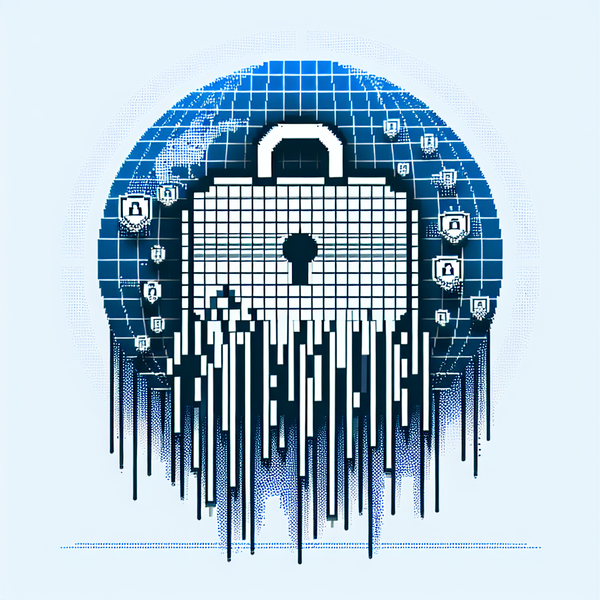Secret CISO 10/11: Qantas & Salesforce Breaches, Apple Bounty Boost, AI Camera Flaws, Kibana XSS Risks

Welcome to today's edition of Secret CISO, where the digital battlefield is more intense than ever. In a world where data is the new gold, breaches are becoming the norm rather than the exception. Today, we delve into a series of alarming cyber incidents that underscore the vulnerabilities of even the most fortified digital fortresses.
First, the skies are turbulent for Qantas as hackers leak 5 million customer records, a stark reminder of the relentless threat posed by ransomware groups. Meanwhile, Salesforce faces a looming threat of a billion-record breach, highlighting the precarious state of data security for tech giants.
In the realm of sports, a major NASCAR team grapples with legal fallout from a data breach, while Chess.com and Discord reveal vulnerabilities in third-party applications, exposing sensitive user data. These incidents emphasize the critical need for comprehensive security strategies across industries.
On the brighter side, Apple is doubling down on security, offering a $2 million bounty for zero-click vulnerabilities, showcasing a proactive approach to safeguarding its ecosystem. Similarly, BlackBerry expands its SecuSUITE to Windows, aiming to bolster secure communications for governments and enterprises.
In the world of vulnerabilities, Elasticsearch and Kibana face significant risks with potential data exposure and unauthorized actions, while NVIDIA and V-SFT highlight the dangers of software flaws that could lead to severe exploits.
Finally, a tale of strategic deception unfolds as researchers outsmart a pro-Russia hacktivist group, proving that sometimes, the best defense is a clever offense.
Stay vigilant, stay informed, and remember, in cybersecurity, knowledge is your best armor.
Data Breaches
- Hackers leak Qantas data containing 5 million customer records after ransom deadline passes: The hacker group Scattered Lapsus$ Hunters released an extortion note on a dark web data leaks site, demanding payment from Qantas. After the ransom deadline passed without payment, they leaked data containing 5 million customer records. This breach highlights the ongoing threat of ransomware attacks on major corporations. Source: The Guardian
- Hackers threaten to release 1 billion customer records by 3pm AEST: Hackers have threatened to leak nearly 1 billion sensitive customer records associated with Salesforce. This massive potential breach underscores the vulnerabilities in data security even for large software giants. The threat has raised significant concerns about the protection of customer data on a global scale. Source: News.com.au
- Major NASCAR race team is latest company hit with lawsuit following data breach: A major NASCAR race team is facing a lawsuit after a data breach, joining at least four other companies that have experienced significant breaches this year. The legal action highlights the increasing legal and financial repercussions companies face following data breaches. This incident serves as a reminder of the importance of robust cybersecurity measures. Source: Union Leader
- Chess.com discloses recent data breach via file transfer app: Chess.com has disclosed a data breach that occurred through a file transfer app, highlighting the vulnerabilities in traditional perimeter-based security constructs. This breach serves as a cautionary tale for organizations relying on third-party applications for data transfer, emphasizing the need for comprehensive security strategies. Source: Digital Journal
- Discord Says 70000 Users Had IDs Exposed in Recent Data Breach: Discord confirmed that hackers stole government ID photos of around 70,000 users in a data breach linked to a third-party customer support service. This breach underscores the risks associated with third-party service providers and the importance of securing user data across all platforms. Source: OODAloop
Security Research
- Apple doubles maximum bug bounty to $2M for zero-click RCEs: Apple has significantly increased its bug bounty program, offering up to $2 million for zero-click remote code execution vulnerabilities. This move aims to incentivize security researchers to uncover and report critical security flaws, enhancing the overall security of Apple products. Since 2020, Apple has paid $35 million to 800 researchers. Source: Security Affairs.
- Manufacturers' Fight Against Ransomware Heats Up: The industrial sector is increasingly targeted by ransomware attacks, with a reported four percent increase in incidents. Security researchers at Coalition highlight the growing threat and emphasize the need for robust cybersecurity measures to protect manufacturing operations from these escalating attacks. Source: Dark Reading.
- BlackBerry Expands SecuSUITE to Windows for Sovereign-Grade Security: BlackBerry has extended its SecuSUITE solution to Windows, providing sovereign-grade security for government and enterprise communications. This expansion aims to enhance secure communication capabilities across different platforms, ensuring data protection and privacy. Source: Zacks.
- Assistant professor in CSSE exposes vulnerability in AI-powered security cameras: Yazhou Tu and his research team have identified critical vulnerabilities in AI-powered security cameras. Their work, coinciding with Cybersecurity Awareness Month, aims to address these flaws and improve the security of AI-driven surveillance systems. Source: Auburn University.
- Pro-Russia hacktivist group dies of cringe after falling into researchers' trap: Security researchers successfully deceived a pro-Russia hacktivist group by creating a fake critical infrastructure organization. The group targeted this decoy, showcasing the effectiveness of strategic deception in cybersecurity defense. Source: The Register.
Top CVEs
- CVE-2025-37727: In Elasticsearch, sensitive information can be inadvertently logged when auditing requests to the reindex API, potentially leading to a loss of confidentiality. This vulnerability requires specific preconditions to be met, making it a targeted risk for organizations relying heavily on Elasticsearch for data management. Source.
- CVE-2025-25017: Kibana, a popular data visualization tool, is vulnerable to Cross-Site Scripting (XSS) due to improper neutralization of input during web page generation. This flaw could allow attackers to execute scripts in the context of the user's session, potentially leading to unauthorized actions or data exposure. Source.
- CVE-2025-25018: Similar to CVE-2025-25017, this vulnerability in Kibana involves stored Cross-Site Scripting (XSS), where malicious scripts can be stored and executed in the context of a user's session. This poses a significant risk for data integrity and user privacy within Kibana environments. Source.
- CVE-2025-23309: A vulnerability in NVIDIA Display Driver allows for uncontrolled DLL loading, which could lead to denial of service, privilege escalation, code execution, and data exposure. This issue highlights the importance of secure software design and the potential risks associated with driver vulnerabilities. Source.
- CVE-2025-61864: A use-after-free vulnerability in V-SFT v6.2.7.0 and earlier can lead to information disclosure, system crashes, and arbitrary code execution. This flaw underscores the critical need for robust memory management practices in software development to prevent exploitation. Source.
Final Words
As we wrap up today's edition of Secret CISO, it's clear that the cybersecurity landscape is as dynamic and challenging as ever. From high-profile data breaches affecting millions to vulnerabilities in widely-used software, the need for vigilance and robust security measures cannot be overstated. Whether it's the ongoing threat of ransomware, the importance of securing third-party applications, or the critical role of bug bounty programs, each story serves as a reminder of the complex web of challenges we face in protecting our digital world.
In this ever-evolving field, sharing knowledge is key. If you found today's insights valuable, consider passing this newsletter along to your friends and colleagues. Together, we can build a more informed and resilient community, ready to tackle the cybersecurity challenges of tomorrow.
Thank you for joining us today. Stay secure, stay informed, and we'll see you in the next edition of Secret CISO!




